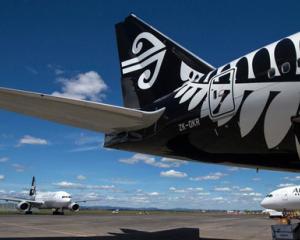Air New Zealand's full year normalised earnings before tax fell 45 percent to $75 million, as the airline took hits from earthquakes in Christchurch and Japan, and from high fuel prices.
That result included a first-half profit of $112m and a second-half loss of $37m.
Chief executive Rob Fyfe said operating conditions in the past six months were cumulatively the most difficult Air New Zealand had faced in the past decade.
The combination of reduced demand for travel as a result of the devastating Christchurch and Japan quakes, additional capacity into Christchurch to help the relief effort and compassionate fares for those affected by the Christchurch earthquakes resulted in an estimated $70m negative impact on earnings, Mr Fyfe said.
Chairman John Palmer said the natural disasters and sustained high fuel prices had "dramatically altered" what had been shaping up to be a positive full year result.
A final divided of 2.5c per share is to be paid, down from 4cps last year.
Revenue from ordinary activities for the 12 months to June 30 was up 7 percent from the previous year to $4.38 billion, while reported net profit slipped 1 percent to $81m.
After tax normalised earnings, which exclude net gains or losses on derivatives that hedge exposures in other financial periods, fell 11 percent to $82m.
The company said it was well placed competitively and expected improved results from initiatives it had in place. In the absence of further deterioration in global economic conditions and an escalation in fuel prices it expected a better financial performance in the 2012 financial year.
Mr Fyfe said Air New Zealand's international long haul network had continued to struggle in the past year against the backdrop of high jet fuel prices and a rising NZ dollar stifling inbound tourism demand from key markets such as the United States and Britain.
Long haul routes in the company's network lost more than $1m a week in the first six months of this calendar year.
Passenger revenue in the latest year was 7 percent or $220m up from the previous year, primarily due to a 2 percent increase in yield and a 4.5 percent lift in demand, Air New Zealand said.
Increased fuel prices combined with more consumption resulted in fuel prices being $145m higher than a year earlier.
Overall the group benefited from a stronger NZ dollar, but the full benefit of the stronger currency was delayed due to the company's currency hedging programme which recorded losses of $118m for the year, compared to a gain of $6m the year before, Air New Zealand said.
Labour costs were up $58m or 6 percent due to increased activity and rate increases.




